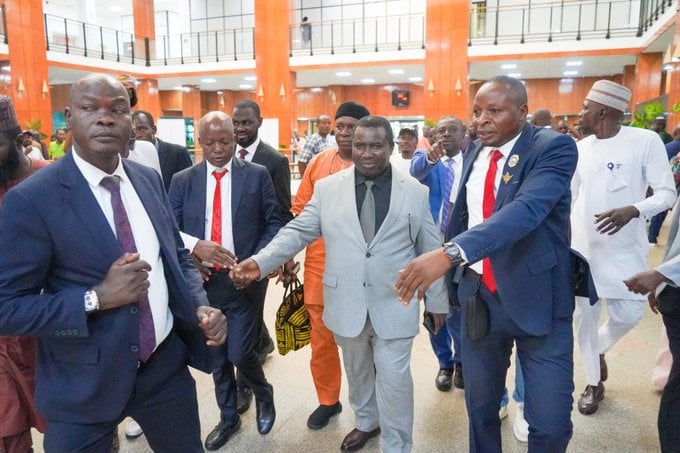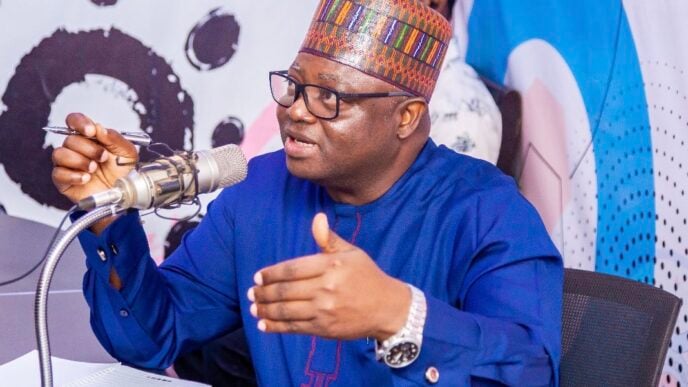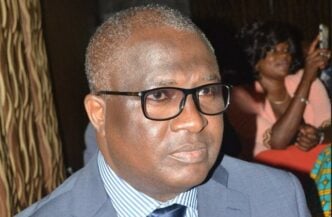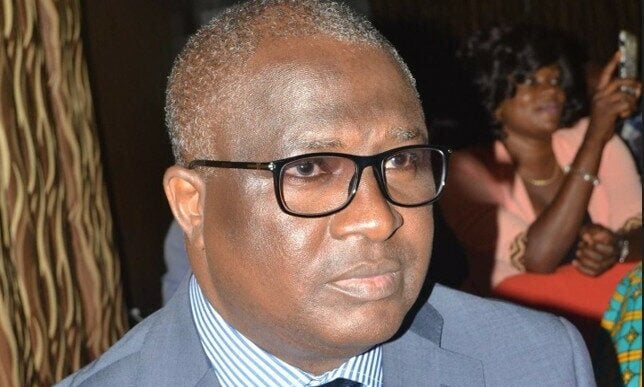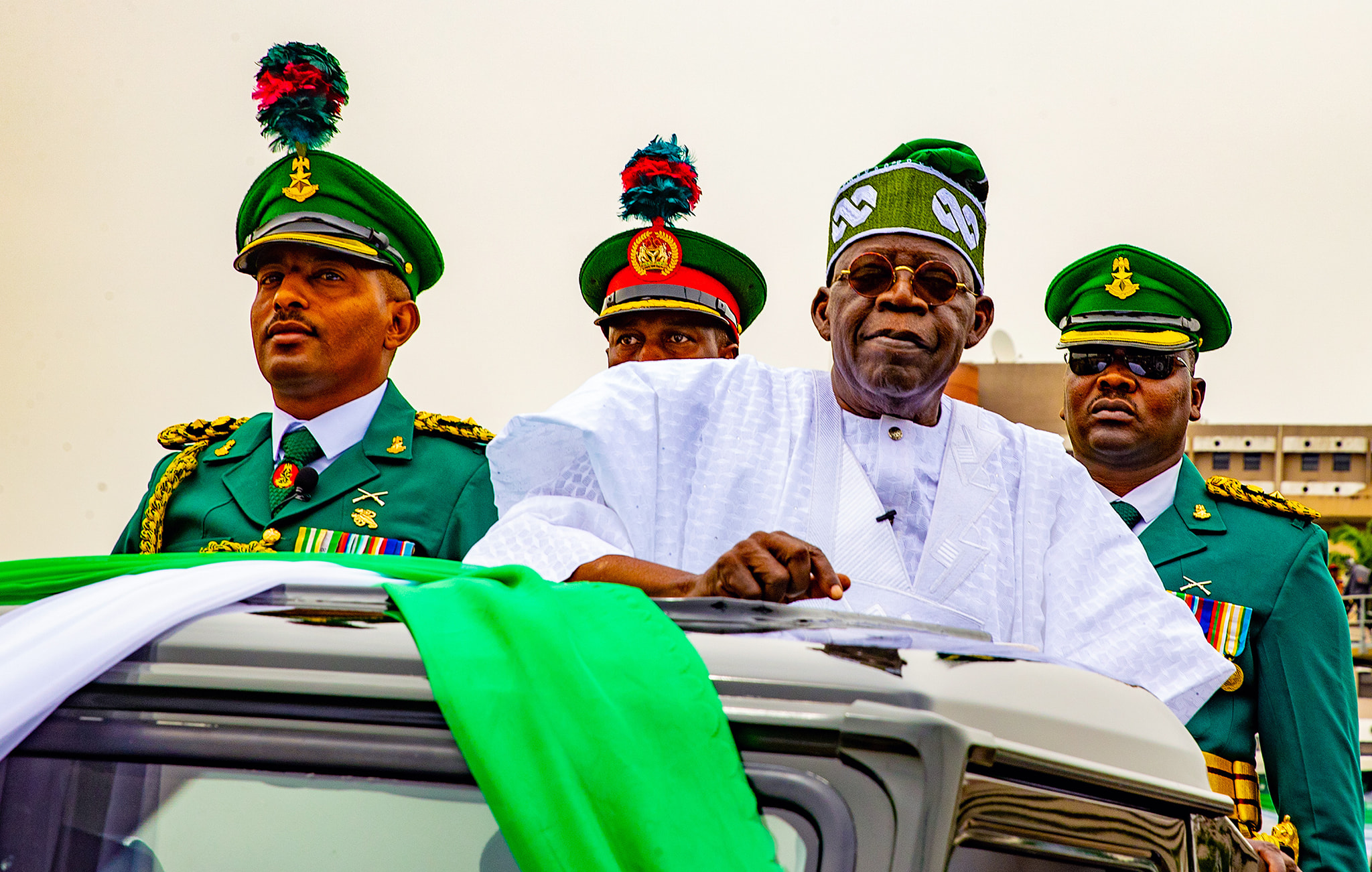Joash Amupitan (middle in grey suit) before his screening by the senate | Photo: Sunday Karimi
For about two hours on Thursday last week, the Nigerian Senate screened and confirmed Professor Joash Amupitan (SAN) as the new Chairman of the Independent National Electoral Commission (INEC). It marked not just the end of a political ritual but also the beginning of an enormous national expectation. We all celebrated his rich resume, garnished with a record of impeccability about which even his traducers are helpless. But now, the “honeymoon,” as they say, is over. The new helmsman of Nigeria’s electoral umpire begins his stewardship in the full glare of public scrutiny and under the burden of huge expectations—with the November 8, 2025, Anambra gubernatorial election as his first litmus test.
Professor Amupitan steps into an institution that has become the heartbeat of Nigeria’s democratic credibility, yet one often accused of faltering when it matters most. He inherits not just an office, but a trust deficit—the heavy burden of restoring public confidence in an electoral system that has, over time, become synonymous with suspicion, litigation, and post-election trauma. Due to a combination of ignorance and mischief, some sections of the Nigerian voting public believe that organising a free, fair, and peaceful election is up to the INEC being up and doing in its responsibilities as spelt out in the enabling laws. But they forget, either innocently or deliberately, that it is not INEC who takes cases to the election petition tribunals. It is not INEC that organises political thuggery, vote-buying, ballot box snatching, hacking into the commission’s server, and other sundry infractions that undermine the process. That, of course, does not exonerate it of its obvious internal lapses that vitiate the conduct of credible elections. Lapses like some staffers being compromised by desperate politicians.
The Task Before the Chairman
As the nation looks forward to the Anambra polls, Amupitan faces the dual challenge of administrative control and moral leadership. He did allude to the fact that he, or anyone who finds himself in any position within INEC, occupies such in trust. He, therefore, promised to take the message to all the staffers of the commission. It is one thing for him to preach; it is another for his audience to listen to what he is saying. Nevertheless, he must do what he needs to do to sanitise the system. So, he must not only ensure that logistics, technology, and manpower align for credible elections, but also rebuild the moral authority of INEC itself. Nigerians are weary of excuses, and the call for transparency has never been louder.
Advertisement
Meanwhile, it bears repeating that the chairman is not a magician. He is not a lone ranger with mystical powers to exorcise all of INEC’s demons. The electoral commission is a vast bureaucratic network, a machinery powered by layers of officials—National Commissioners, Resident Electoral Commissioners (RECs), Electoral Officers, and ad hoc staff numbering in the hundreds. Among these categories of personnel are the principalities who seem to have vowed that a credible election would always elude us in this country. They’re powerful and well-entrenched, but not invincible.
Each cog in this wheel has a role to play in either sustaining or sabotaging the process. Working with, or under, him would be 12 other commissioners, 36 Resident Electoral Commissioners (RECs at the state level), 774 Electoral Officers (at the local government level), and thousands of ad hoc staffers (university lecturers and National Youth Corps members). Let’s also not forget other agencies it has to collaborate with for security and logistics. That of the press, civil society organizations, and political parties needs little or no elaboration.
A Collective Responsibility
Advertisement
To expect one man to singlehandedly sanitise Nigeria’s electoral system is both unfair and unrealistic. Professor Amupitan may provide vision, direction, and leadership, but he cannot be everywhere at once. The success or failure of elections depends on the integrity and competence of every cadre within INEC, as well as the cooperation of political parties, aspirants, candidates, security agencies, the media, and the electorate themselves. Wherever there is a need for legislative intervention, the National Assembly too comes into the picture.
The Nigerian public, therefore, must moderate their expectations—not as a call to complacency or settling for the minimal, but rather as an invitation to circumspection and realism. The chairman’s effectiveness will, to a large extent, depend on how much institutional synergy and stakeholders’ discipline can be achieved.
Rebuilding Confidence: A Shared Mandate
Re-establishing public confidence in Nigeria’s electoral process requires more than soundbites and solemn oaths. It demands institutional integrity, technological reliability, and citizen participation. The chairman must lead reforms that make voter registration, result transmission, and election management more transparent. But equally, Nigerians must own the process—by voting, by protecting their votes, and by demanding accountability from all actors in the democratic chain. Amupitan has promised us that he will work towards conducting elections in such a way that the loser will have no difficulty being the first person to congratulate the winner. We all must, therefore, help him to help us achieve that. Contrary to the thinking of people with vested interests who are ready to do anything to win, the result of an election is not as important as the process. That is the process we look forward to having, as the Ayetoro-Gbede-born Professor of Law mounts the saddle of leadership at the INEC.
Advertisement
The Road Ahead
As Professor Amupitan takes his seat at the commission’s highest table, he must be conscious of the fact that posterity is already watching and taking notes. His first outing in Anambra will, more likely than not, set the tone for his tenure—either as another episode of electoral déjà vu or as the dawn of a credible electoral rebirth. I sincerely wish and pray for the latter.
But he cannot do it alone. The redemption of Nigeria’s electoral system is not a burden for one man but the responsibility of a nation. If every stakeholder—INEC staff, the political class, security agents, the media, and voters—does its part, then perhaps, for once, we might not just conduct an election but build democracy and future stability.
Abubakar writes from Ilorin, Kwara State. He can be reached via 08051388285 or [email protected].
Advertisement
Views expressed by contributors are strictly personal and not of TheCable.

